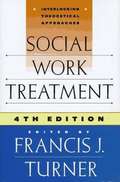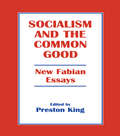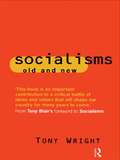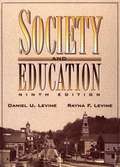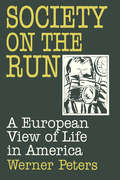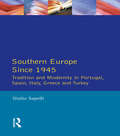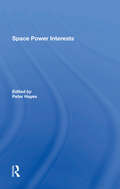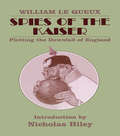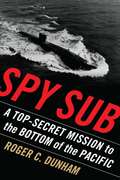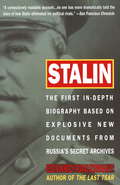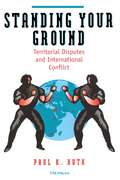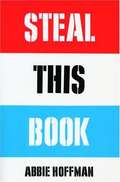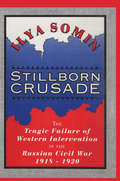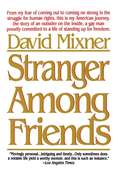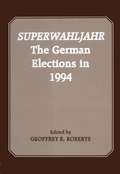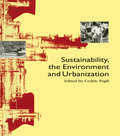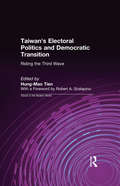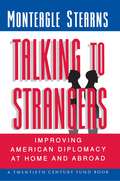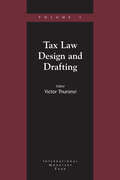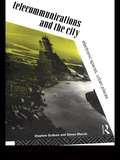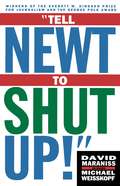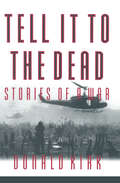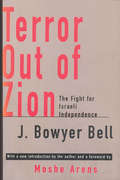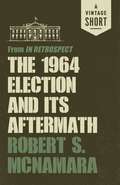- Table View
- List View
Social Work Treatment: Interlocking Theoretical Approaches (4th edition)
by Francis J. TurnerIntroduces theoretical systems, Aboriginal theory, narrative, hypnosis, constructivism, and empowerment theory and examines the full range of therapeutic approaches, including psychoanalysis, ego psychology, cognitive, crisis intervention, client-centered theory, feminist theory and meditation. The style and content of the chapters are practice-oriented, concentrate on the use of systems in a practical context, and, together with detailed descriptions of each theoretical system, explore their real-world implementation. Annotation c. by Book News, Inc., Portland, Or.
Socialism and the Common Good: New Fabian Essays
by Preston KingIn this collection, contributors discuss a central theme which is both theoretical and practical - the role of the state in achieving social justice in modern market systems from a socialist perspective. They reject the cult of choice and of rational egoism.
Socialisms: Old and New
by Tony WrightThis is a revised and updated edition of Tony Wright's critically acclaimed work that first appeared a decade ago. It provides a lucid and accesible survey of the major strands of socialist thinking right up to the present day and includes an assessment of the renewal of socialism in Britain. It is an indispensable text for students and a stimulating guide to socialism past and present. But it is also a book with an argument. Tony Wright makes the case for a socialism that learns the lessons of its own history, roots itself in an ethic of community and applies traditional values in new ways. It is a book for everyone who wants to understand where socialism has come from - and where it might still be going.
Society and Education
by Daniel U. Levine Rayna F. LevineThe Ninth Edition of Society and Education continues its tradition of incorporating forward-looking material. Reflecting both recent developments and long-range trends involving the relationships between education and other social institutions, it continues to provide a balanced treatment of controversial issues — in sufficient depth to help readers understand complicated and important topics to current and future teachers and administrators.
Society on the Run: A European View of Life in America
by W. PetersA study of the United States and its political culture. The author contends that democracy exists at the level of political institutions and processes in the US as well as in its private sector.
Southern Europe: Politics, Society and Economics Since 1945
by Giulio SapelliUntil relatively recently most of southern Europe was governed by authoritarian dictatorships, but within the space of two decades more or less stable democracies have become established throughout the entire region. At the same time, backward peasant economies have been transformed by the injection of huge amounts of capital and new technology, into modern economies which are now approaching the size of the more established economies of Northern Europe.Southern Europe is a major contribution to our understanding of European politics. The product of original research and synthesis on exceptionally wide literature, it provides authoritative and systematic coverage of the politics, economics and society of this important region of Europe from 1945, up to the 1994 election of Silvio Berlusconi's far right alliance in Italy.
Space Power Interests
by Peter HayesIn this unique volume, an international cast of leading scholars from several disciplines offers a comprehensive assessment of the current status of space-based weaponry. Regional and technical experts offer their analysis of the major powers' special interests in space and also examine the broader issues of ICBM proliferation, testing, monitoring, and verification as well as possible opportunities for cooperation between states with a stake in space power.
Spain and Portugal in the European Union: The First Fifteen Years (South European Society and Politics)
by Paul Christopher Manuel Sebastián RoyoThis publication provides an up-to-date assessment of the political and economic issues and is valuable reading for anyone wishing to understand contemporary Spain and Portugal.Following decades of relative isolation under authoritarian regimes, the success of the processes of democratic transition in both countries paved the way for full membership in the European Community in 1986. Drawing on research by established scholars, Spain and Portugal in the European Union offers an original series of analyses of the development of Iberian politics, sociology and economics since the accession to the European Union.
Spies of the Kaiser: Plotting the Downfall of England (Classics Of Espionage Ser.)
by William Le QueuxLe Queux was the first and most prolific of all British spy writers, but Spies of the Kaiser was not just another tale of scheming foreigners and plucky British heroes, for this paranoid tale of German secret agents plotting the invasion of Britain played a major part in the formation of MI5, Britain's counter-espionage organisation. In his introduction, intelligence historian Nicholas Hiley explains how Le Queux's powerful blend of fact and fiction inspired a whole generation of British secret service officers, and led MI5 in a nation-wide hunt for a non-existent enemy.
Spy Sub
by Roger C. DunhamThis is a story about a secret mission to find a lost Soviet submarine in the great depths of the Pacific Ocean, a mission never acknowledged by the U. S. Department of Defense. Deeply beneath the searching navy of the Soviet Union, the nuclear submarine hunt was so secret that even the men on the vessel never knew the object of their search. The brave exploits of these sailors and their remarkable commanding officer, enduring near-tragedies at sea and nearly-impossible challenges deep under the Pacific, are described by the author who also provides his own personal experiences under the tightest secrecy ever required for a submarine mission. The failures, the near catastrophes, and the challenges are described in personal detail, and the final outcome bringing critical Cold War information to the president of the United States is a saga like none in the annals of submarine exploits.
Stalin
by Edvard RadzinskyFrom the author of The Last Tsar, the first full-scale life of Stalin to have what no previous biography has entirely gotten hold of: the facts. Granted privileged access to Russia's secret archives, Edvard Radzinsky paints a picture of the Soviet strongman as more calculating, ruthless, and blood-crazed than has ever been described or imagined. Stalin was a man for whom power was all, terror a useful weapon, and deceit a constant companion. As Radzinsky narrates the high drama of Stalin's epic quest for domination-first within the Communist Party, then over the Soviet Union and the world-he uncovers the startling truth about this most enigmatic of historical figures. Only now, in the post-Soviet era, can what was suppressed be told: Stalin's long-denied involvement with terrorism as a young revolutionary; the crucial importance of his misunderstood, behind-the-scenes role during the October Revolution; his often hostile relationship with Lenin; the details of his organization of terror, culminating in the infamous show trials of the 1930s; his secret dealings with Hitler, and how they backfired; and the horrifying plans he was making before his death to send the Soviet Union's Jews to concentration camps-tantamount to a potential second Holocaust. Radzinsky also takes an intimate look at Stalin's private life, marked by his turbulent relationship with his wife Nadezhda, and recreates the circumstances that led to her suicide. As he did in The Last Tsar, Radzinsky thrillingly brings the past to life. The Kremlin intrigues, the ceaseless round of double-dealing and back-stabbing, the private worlds of the Soviet Empire's ruling class-all become, in Radzinsky's hands, as gripping and powerful as the great Russian sagas. And the riddle of that most cold-blooded of leaders, a man for whom nothing was sacred in his pursuit of absolute might--and perhaps the greatest mass murderer in Western history--is solved.From the Trade Paperback edition.
Standing Your Ground
by Paul K. HuthThrough an examination of 129 territorial disputes between 1950 and 1990, Paul Huth presents a new theoretical approach for analyzing the foreign policy behavior of states, one that integrates insights from traditional realist as well as domestic political approaches to the study of foreign policy. Huth's approach is premised on the belief that powerful explanations of security policy must be built on the recognition that foreign policy leaders are domestic politicians who are very attentive to the domestic implications of foreign policy actions. Hypotheses derived from this new modified realist mode are then empirically tested by a combination of statistical and case study analysis.
Steal This Book
by Abbie HoffmanA classic of counterculture literature and one of the most influential and controversial documents of the 20th century, this is an instruction manual for young activists and radical social change.
Stillborn Crusade: The Tragic Failure of Western Intervention in the Former Soviet Union
by Ilya SominThe triumph of the Bolsheviks in the Russian Civil War was the first great crack in the system of international relations established by the victorious Allies. The presence of a powerful anti-Western Soviet regime not only undermined the liberal values binding the signatories and member states of the Versailles Treaty and the League of Nations, but also helped to stimulate the rise of aggressive fascist dictatorships in Germany and Italy. Consequently, the failure of the Allies to intervene effectively against the Bolsheviks helped pave the way for both World War II and the human catastrophe of Soviet totalitarianism. Stillborn Crusade is a reinterpretation of the causes and consequences of that failure.In sharp contrast with previous researchers, Ilya Somin argues that the West's failure resulted not from constraints limiting the options of policymakers, but from ideological misconceptions, particularly those flowing from the "liberal" and "realist" theories of international politics. The liberal view, based on the right of national self-determination, was espoused by Woodrow Wilson, and David Lloyd George. While unsympathetic to Bolshevism, they remained wedded to preconceived ideas on revolution, intervention, and the efficacy of force. The realists thought that the opposing Whites might constitute a greater threat to Western interests; they discounted the role of ideology in Soviet foreign policy. Against these views, Somin sets the position of Winston Churchill, who repeatedly and unsuccessfully urged decisive action when the Soviet regime was militarily vulnerable. As a consequence of British and American policy failures, the entire course of European and world history was radically altered for the worse.Stillborn Crusade also considers why earlier scholars, most notably George F. Kennan and William Appleman Williams, have ignored the issues raised here, even though they and others have not hesitated to criticize Western leaders for similar errors in other instances, especially in the case of Nazi Germany. Somin links the errors of 1918-20 to broader issues relating to the morality, feasibility, and desirability of Western, especially American, intervention in foreign civil conflicts. As a volume with important lessons for our own time, Stillborn Crusade will be of interest to historians, political scientists, and foreign policy analysts.
Stranger Among Friends
by David Mixner"From my fear of coming out to coming on strong in the struggle for human rights, this is my American journey, the story of an outsider on the inside, a gay man proudly committed to a life of standing up for freedom."<P> "President Clinton and I were born three days apart. We had both dreamed of serving our country. There was one difference: He could pursue his dream, while I felt I could not. The President was born straight and I was born gay."<P> In this stirring personal history, one of America's most influential gay rights advocates recounts his extraordinary career as a policy maker and adviser to the major political leaders of our time, and his own often anguishing, ultimately triumphant life as a gay man. A longtime personal friend of Bill Clinton, inStranger Among FriendsDavid Mixner offers an insider's look at the power struggles that occur every day in our nation's capital and candid insights on the Clinton administration's successes and failures. Spanning three decades of human rights activism--from the behind-the-scenes negotiations to the painful betrayals to the hard-won victories--his forthright story unflinchingly explores what it means to be an outsider on the inside, and sends a message of hope to all who have ever stood up for what they believe.
Superwahljahr: The German Elections in 1994
by Geoffrey K. RobertsThe elections in 1994 in Germany gave rise to the word Superwahjahr (super-election year). In addition to the election of a new Bundestag in October, there was a presidential election, elections to the European Parliament and elections for seven Länder parliaments. This book provides a set of analyses of those elections, with emphasis on the Bundestag election.
Sustainability the Environment and Urbanisation
by Cedric PughThe 1992 Rio Summit and subsequent literature and debate has focused on 'green' issues such as biodiversity, climate change and marine pollution. Much less has been written concerning the 'brown' agenda: factors such as poor sanitation and water quality, air pollution and housing problems which are particularly prevalent in Third World cities. Sustainability, the Environment and Urbanisation provides a comprehensive overview of the brown agenda, with case studies and examples from a number of Southern countries. It looks at the broad economic context behind the problems and covers the conceptual issues of sustainability, infrastructure and health programmes, as well as assessing environmental appraisal methods. Clearly written, with contributions from some of the leading experts in the field, the book will appeal to students on environmental and developmental courses, researchers, and all those concerned with the 'healthy cities' movement.
Taiwan's Electoral Politics and Democratic Transition: Riding the Third Wave (Taiwan In The Modern World Ser.)
by Hung-Mao TienAn examination of the evolution of the democratic two-party system in Taiwan. This work explores the growth of Taiwan's competitive party system in the context of social attitudes, issue-based politics and local factions.
Talking to Strangers: Improving American Diplomacy at Home and Abroad
by Monteagle StearnsIn this discerning book, Monteagle Stearns, a former career diplomat and ambassador, argues that U.S. foreign policymakers do not need a new doctrine, as some commentators have suggested, but rather a new attitude toward international affairs and, most especially, new ways of learning from the Foreign Service. True, the word strangers in his title refers to foreigners. However, it also refers to American foreign policymakers and American diplomats, whose failure to "speak each other's language" deprives American foreign policy of realism and coherence. In a world where regions have become more important than blocs, and ethnic and transnational problems more important than superpower rivalries, American foreign policy must be better informed if it is to be more effective. The insights required will come not from summit meetings or television specials but from the firsthand observations of trained Foreign Service officers.Stearns has not written an apologia for the American Foreign Service, however. Indeed, his criticism of many of its weaknesses is biting. Ranging from a description of Benjamin Franklin's mission to France to an analysis of the Gulf War and its aftermath, he offers a balanced critique of how American diplomacy developed in reaction to European models and how it needs to be changed to satisfy the demands of the twenty-first century. Full of examples drawn from Stearns's extensive experience, Talking to Strangers addresses the problems that arise not only from an overly politicized foreign policy process but also from excessive bureaucratization and lack of leadership in the Foreign Service itself. Anyone interested in our nation's future will benefit from reading Stearns's pull-no-punches analysis of why improving American diplomacy should be a matter of urgent concern to us all.
Tax Law Design and Drafting, Volume 1: [subtitle]
by Victor T ThuronyiA report from the International Monetary Fund.
Telecommunications and the City: Electronic Spaces, Urban Places
by Steve Graham Simon MarvinTelecommunications and the City provides the first critical and state-of-the-art review of the relations between telecommunications and all aspects of city development and management.Drawing on a range of theoretical approaches and a wide body of recent research, the book addresses key academic and policy debates about technological change and the future of cities with a fresh perspective. Through this approach, the complex and crucial transformations underway in cities in which telecommunications have central importance are mapped out and illustrated. Key areas where telecommunications impinge on the economic, social, physical, enviromental and institutional development of cities are illustrated by using boxed extracts and wide range of case study examples from Europe, Japan and North America.Rejecting the extremes of optimism and pessimism in current hype about cities and telecommunications, Telecommunications and the City offers a sophisticated new perspective through which city-telecommunications relations can be understood.
Tell Newt to Shut Up: Prize-winning Washington Post Journalists Reveal How Reality Gagged the Gingrich Revolution
by Michael Weisskopf David MaranissPRIZEWINNING WASHINGTON POST JOURNALISTS REVEAL HOW REALITY GAGGED THE GINGRICH REVOLUTION Speaker Newt Gingrich and his troops promised a revolution when they seized power in January 1995. The year that followed was one of the most fascinating and tumultuous in modern American history. After stunning early success with the Contract with America, the Republicans began to lose momentum; by year's end Gingrich was isolated and uncertain, and his closest allies were telling him to shut up. Here is an unprecedented, fly-on-the-wall look at the successes, sellouts, and perhaps fatal mistakes of Newt Gingrich's Republican Revolution. Based on the award-winning Washington Post series that documented the Republicans' day-to-day attempts to revolutionize the American government, "Tell Newt to Shut Up!" gets to the heart of the political process.
Tell it to the Dead: Memories of a War
by Donald KirkThis work reports on the Vietnam war as seen by the GI in the jungles. It discusses current attitudes, views from Saigon, Hanoi and Phnom Penh, and other locales in the countryside.
Terror Out of Zion: Fight for Israeli Independence
by J. Bowyer BellWe fight, therefore we are. This revision of Cartesian wisdom was enunciated by the late premier of Israel, Menachim Begin. It is the leitmotif of this brilliant study of the military origins of modern Israel. J. Bowyer Bell argues that the members of Irgun, Lehi (the Stern Gang), and the Zionist underground in British mandated Palestine had clear motives for the violent path they took: the creation of a sovereign homeland for the Jewish people in oppressed lands. These advocates of terror pitted themselves against not only the British and the Arabs, but also against less violent brethren like Ben Gurion, Moshe Dayan, and Yitzhak Rabin.This is the definitive story of desperate, dedicated revolutionaries who were driven to conclude that lives must be taken if Israel were to live. The dynamite bombing of the King David Hotel, the assassination of Lord Moyne in Cairo, and Count Bernardotte ,in Palestine were but a few acts of terror which forced the British out of the Middle East. Terror Out of Zion evaluates whether these acts were extremist or necessary, and whether these men and women were fanatics or freedom fighters.Terror Out of Zion serves as a primer for those who would understand contemporary political divisions in Israel. It is based on careful historical research and interviews with surviving members of the Irgun, chronicling bombings, assassinations, hah- breadth prison escapes, and endless cycles of retaliation in the terror that gave birth to Israel, but, no less, continues to inform its political relations. Bell has fashioned an adventure story that also explains the sources of current tensions and frictions within Israel.Publishers' Weekly wrote that Bell's book crackles with suspense and explodes with tales of carnage and violence; it could hardly be otherwise. Yet he writes with compassion and insight into the black despair that engendered the terrorist's brutal deeds. And a highly laudat
The 1964 Election and Its Aftermath: from In Retrospect
by Robert Mcnamara"Can anyone remember a public official with the courage to confess error and explain where he and his country went wrong? This is what Robert McNamara does in this brave, honest, honorable, and altogether compelling book."—Arthur Schlesinger, Jr. Written twenty years after the end of the Vietnam War, former Secretary of Defense Robert McNamara's controversial memoir answers the lingering questions that surround this disastrous episode in American history, and chronicles the political events and fatal misassumptions that were behind the US involvement in Vietnam.A Vintage Shorts Vietnam Selection. An ebook short.
